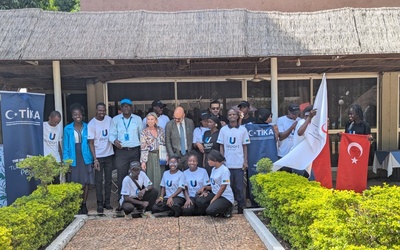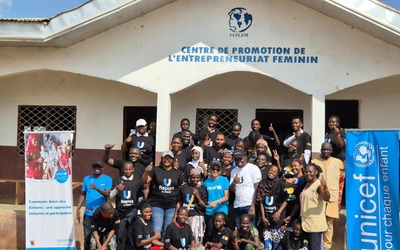If no action is taken, close to 950 million women would have been married as children by 2030.
Despite being prohibited by International laws, child marriage continues to deprive millions of girls worldwide of their childhood while infringing on their fundamental human rights. It is defined as a legal, customary or traditional union involving a boy or a girl below the age of 18 and it mostly affects young girls.
Globally, close to 15 million young girls are married before 18 years each year. In Cameroon, more than one in every three girls marries before 18 years and 11% of adult women reported to have been married before the age of 15 in 2014.
Such marriages are a gross violation to girls’ rights and have severe impacts on them. Child marriage does not only deprive young girls of their child hood but it is extremely harmful to their socioeconomic development, psychosomatic wellbeing as well as their sexual and reproductive health. This phenomenon therefore dooms these young brides to chronic poverty, social inequalities and exclusion, poor health with risks of contracting HIV and other sexually transmitted infections and even early death, preventing economies from gifted labor force.
Even though Cameroon is a signatory of the 1989 United Nations Convention on the Rights of the Child that sets the minimum age for marriage at 18 years, the country’s civil code permits the marriage of girls at 15 years upon parental permission and 18 years for boys. However, the country is adopting new procedures to halt this harmful traditional practice within its territory. It is against this backdrop that Cameroon’s new penal code enacted as law in July 2016, in its section 356 sanctions anyone who compels another to marry before 18 with imprisonment from 5-10 years and a fine from 25.000 to 1.000.000 FCFA. Meanwhile, the lack of denunciation does not permit the assessment of both the effectiveness and efficacy of such a measure.
Cameroon launched its national awareness campaign to end child marriage today at Hilton Hotel, Yaoundé together with its international partners who are engaged in diverse ways and activities to raise awareness and advocate for the end of this practice in Cameroon, especially an increase of the legal age for marriage of girls from 15 to 18 years.
UNICEF has partnered with the African Football Confederation (CAF) to use the African Women Football Cup scheduled from November 19 to December 3 in Cameroon to sensitize the public on the impacts of child marriage.
Education is one of the most sustainable and profitable solutions against child marriage as it will permit girls to eventually become independent, play active and leading roles within society, break the chain of poverty and make optimum life decisions and choices. Nonetheless, parents, traditional rulers, religious leaders, NGOs and Women’s Associations, elected officials and administrative authorities, and the media all have a role to play to free Cameroon from this harmful practice.
Your responsibility is to spread the word! Raise awareness especially in communities where you live and know the practice is rampant. You can also join the Government and her Partners plus the Civil Society to #EndChildMarriage in Cameroon by making your voice heard during today’s survey on child marriage.
Resources:
State of the World’s Children, UNICEF, 2016
UNICEF Cameroon Annual Report, 2015
The Cameroon Penal Code, 2016
MICS 2014








